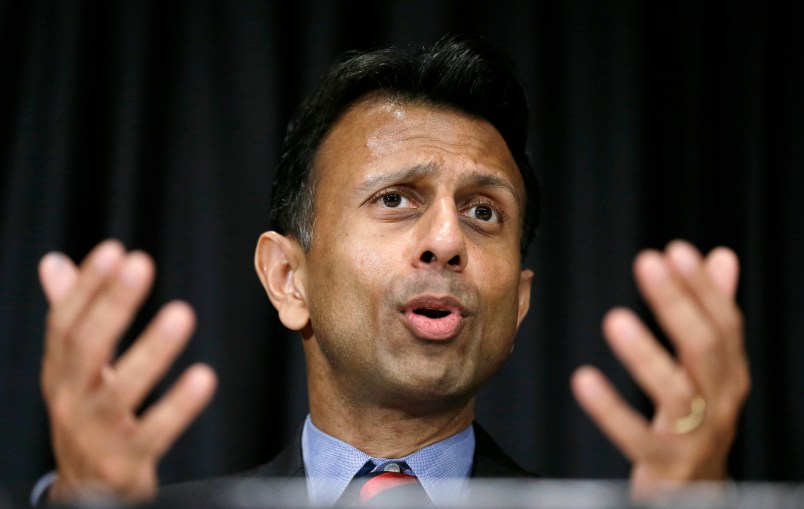With an executive order issued Tuesday evening, Louisiana Gov. Bobby Jindal made clear he intended to enforce his own version of a religious freedom proposal that hours earlier the state House had killed in committee. However, Jindal’s intentions aside, legal experts tell TPM the executive order will have little practical effect.
“As far as real world effects in Louisiana? Probably not much,” Keith Werhan, a professor of law at Tulane University said. But it’s important to recognize, Werhan said, that this amounts to a state symbolically “legitimizing discriminatory treatment against same-sex couples.”
While the original religious freedom legislation was much broader, the version that died in committee Tuesday would have prohibited the government from taking actions against people or business for their views on same-sex marriages, such as imposing fines on a business, revoking its license or withdrawing its tax benefits. Jindal’s order aspires to do the same thing, but it only applies to the actions that are taken by the executive branch of the state government, which makes it much narrower than the legislative version that didn’t make it out of the statehouse.
For instance, if same-sex marriage were to become legal in the state, it would not apply to parish clerks who refuse to grant same-sex marriage licenses on religious grounds, as they operate within the state’s judicial branch, Jindal’s office confirmed to TPM.
An example where it would apply: “A person seeking a law license cannot have that license withheld from them simply because they have a sincerely held religious belief about traditional marriage,” Shannon Bates Dirmann, a spokesperson for Jindal, told TPM. “There have been similar instances in other states, which is why the executive order is necessary — to protect that person.”
However, others were skeptical that such protections were necessary in the first place.
“The whole thing seems a symbolic statement on the basis of imaginary fears that some people have,” Werhan said.
The order also said it should “not be construed to authorize any act of discrimination.” But given that the state does not have not have any legal protections for gays and lesbians against discrimination, determining what new religious exemptions the executive order purports to give gay-marriage objectors is difficult, according to Ira “Chip” Lupu, a professor of law at George Washington University.
“Under the state laws that exist, I don’t think it is going to have any consequences in the short run, because these people aren’t prohibited from discriminating [against gays and lesbians] anyway,” Lupu told TPM. “It’s a preemptive strike against some future legislation” that would prohibit LGBT discrimination, he said.
However, if a future administration chose to seek such anti-discrimination measures, it could also also easily undo Jindal’s executive order.
“The thing about an executive order, they can be revoked as easily as they’re written,” said Werhan. “It really is sort of pointless.”
Another point of confusion is how it would interact with local governments like New Orleans’ that have put in place some anti-discrimination protections for gays and lesbians. The order says it applies to “political subdivisions,” which suggested to some legal experts that cities and towns would be included. However, Dirmann clarified that “local governments are completely within their discretion to enact whatever ordinances they wish.”
“Everyone is confused by it, because it doesn’t make a lot of sense — which is never a good thing,” said Marjorie R. Esman, the director of the ACLU-Louisiana.
While the impact of the order is still being sorted out, observers say Jindal’s motivation is obvious.
“Making sense out of all this is not easy. It strikes me (and you, I suspect) as far more a political document than a legal one,” Lupu told TPM in a follow-up email.
Esman accused the governor of “pandering of the far, far right” ahead of a potential presidential campaign.
“This is a last ditch effort for people who can’t get their way through the standard procedure,” she said.







So long as Jindal leaves alone the traditional Louisiana post-coitus meal of Tater-Tots® and gravy he’s alright with me.
Jindal imagines Jesus nailed to the Sword of Gryffindor…
THAnk gOODness. NOW the heAlth DEpaRTmENts FOR PIZZa REsTAURANts can"T BE sUED for NOT ISSUing PerMITS foR GAY PIzza.
So it is essentially a presidential campaign press release.
The Party of Stupid reins.